| Home | About | Archives | RSS Feed |

Gubernatorial Candidate Falchuk Picks Running Mate
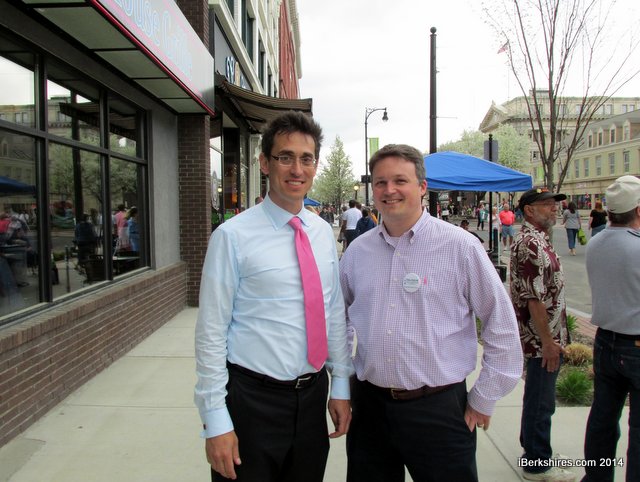 Evan Falchuk and Angus Jennings are launching a new, independent party and campaign for governor. Evan Falchuk and Angus Jennings are launching a new, independent party and campaign for governor. |
PITTSFIELD, Mass. — Angus Jennings has spent most of his career in town and city halls across the state.
As a municipal planner and consultant, he has heard all of the great ideas and plans to revitalize downtrodden towns. He has seen the problems with transportation, economic development, infrastructure and housing.
But, there always seems to be a gap when it comes to the state's support to getting projects completed.
Last year, he met Evan Falchuk, who formed the United Independent Party. The party's goal is to cut through all of the political bickering to tackle the issues cities and towns face. Instead of passing bills that only make small progress on major topics, Falchuk is calling for fully revamping the political process to address the issues head on.
"It is going to be Democrats versus Republicans. It will be small progress on issues that really matter," Falchuk said on Thursday, as he walked around downtown Pittsfield.
Falchuk is running for governor with a focus on bringing leadership that can cut through the minutia. He picked Jennings to run with him as lieutenant governor.
"It is a very brave decision that he's made personally and what he had already done, which was to create the united independent party, was some thing very, very inspiring to me as a voter," Jennings said.
"I, like so many other people, felt like the system has not been responsive in not only doing what ought to be done but also not talking about what could be done. The decision making process on Beacon Hill is so insular."
Jennings, who grew up in Wilbraham, has consulted with more than 35 towns throughout the state in planning. In 2006, he was hired by the city of Pittsfield to work on zoning changes.
Partly of his work, the Rice Silk Mill apartments were renovated on brownfields property, providing housing aimed to gentrify the Tyler Street area.
His expertise in housing is one of the major aspects he brings to the campaign. One of the major issues the Falchuk campaign is focusing on is ways to lower the cost of living across the state.
Further, Jennings' experience with planning boards, city councils and the particular efforts of various towns for revitalization would help align leadership with the priorities of the communities, he said.
Jennings pointed to the Beacon Cinema on North Street as an example of something that requires a lot of work to make happen but yields a high reward in the city's downtown.
| Related Stories |
"I see that as evidence of what Pittsfield has done right. And Pittsfield has done a lot right with North Street. You see it with the activity and the investment," Jennings said. "That movie theater that might not stand out to some people. But to me, it stands out because I know how much work goes into making that happen."
He says people on the local level know the specific needs when it comes to housing, economic growth and transportation. They have the ideas that would streamline the solutions. But, those ideas aren't finding their way to Beacon Hill, he said.
Falchuk pointed to the closure of North Adams Regional Hospital as an example of how the state isn't aligning its leadership with citizens. He says it is a "real crisis" that the eastern part of the state knows and cares little about.
"They're seeing state leadership that doesn't seem to pay attention to the issues out here," he said.
And since launching his campaign last fall, he says he is finding a lot of people who agree with him that the dynamics of the political conversation needs to change.
"The campaign has grown a lot. We've got a dozen full-time people, we've got hundreds of volunteers across the commonwealth. Our message of smart, brave reform and the need to have a new framework to bring about meaningful change is really resonating with people," he said.
As the election start gets closer and the party primaries creep up, Falchuk said more people will be paying attention and more people will start seeing the same political bickering.
"I sit on these panels with the gubernatorial candidates and you hear them say these nice sounding, vague things that don't mean a lot," Falchuk said.
He says his campaign will be focused on "getting more into the substance" of issues.
But first, they have to collect 10,000 signatures to be on the ballot. Falchuk says he hopes to submit 20,000.
Statewide Candidates Queried on Mandates, Hospitals
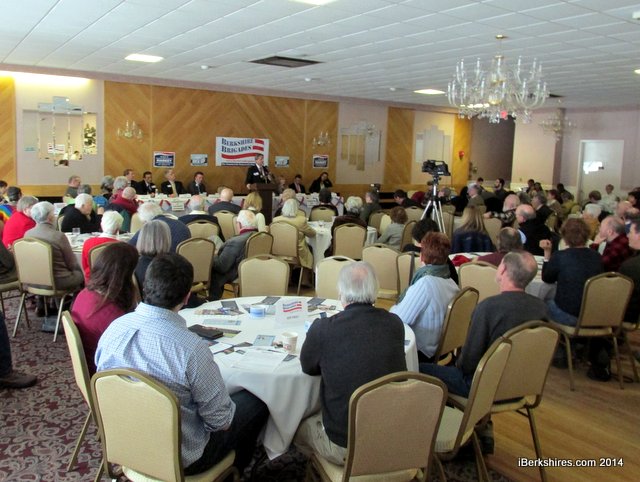 Candidates for lieutenant governor and governor attended Sunday's forum. Candidates for lieutenant governor and governor attended Sunday's forum. |
PITTSFIELD, Mass. — Candidates running for the Democratic nominations for lieutenant governor and governor fielded questions from the audience on Sunday as part of a forum hosted by the Berkshire Brigades.
The local Democratic organizing arm had invited the candidates to introduce themselves in the run up to the local caucuses and the state Democratic Party Convention in June. The primary election is in September.
The candidates were first allowed 5 to 10 minutes to talk about themselves and their platforms, after an address to the group by U.S. Sen. Edward Markey, and later mingled with the crowd.
Read by Brigade member Lee Harrison, the lieutenant governor candidates were asked about their relationship with whoever is elected governor while the gubernatorial candidates were asked about access to physicians and unfunded mandates.
All of the gubernatorial candidates said any state mandates on municipalities should be coupled with dollars to fund them.
Joseph Avellone said mandates dig into unrestricted aid, which is aimed to help towns reduce their property tax burdens on residents.
"The state has a very important role in helping to fund local government because of our property tax set up. But it can't come with a lot of unfunded mandates," Avellone said of unrestricted, local aid.
Donald Berwick called the mandates "unfair" and said "the responsibility should lie with those who pass the mandates." He called for a "realistic revenue policy" that includes lowering health-care costs, closing tax loopholes and switching to a progressive tax.
"We've got to look at this as a whole," he said.
Martha Coakley simply said any mandate requiring funds must be supplemented by the state or not done at all.
"I don't like them. I think they should end. If the state is going to mandate something — and I'll add the caviad on that costs money, some mandates don't but most have a pricetag attached — the state either has to provide ways to supplement that or not do it," Coakley said.
Steven Grossman particularly said circuit breaker accounts for special education need to be fully funded. It isn't just mandates, he said, it is issues like road infrastructure that burden towns as well.
"That may not be an unfunded mandate but it is a requirement that we fix the roads and bridges. As governor, I would make sure we provided at least the $300 million the Legislature decided to do and all of the money would be released by April 1 so the cities can bid them out."
Juliette Kayyem said unfunded mandates signal a lack of transparency in government. She also called for towns to work cooperatively and invest in regional planning and investments.
"I think they are wrong generally unless they have a separate revenue source," she said of the mandates.
As for access to hospitals, Kayyem, a security expert, said she would "give a little tough love" as governor to increase safety. She also said she would invest in first responders and medical staff. Further, she called for changes to zoning bylaws to protect individuals from natural disasters, which was part of a two-part question of hospital safety.
Grossman said he'd implement a program to send new medical school graduates to so-called Gateway Cities and rural areas for a few years and, in turn, the state would forgive their loans.
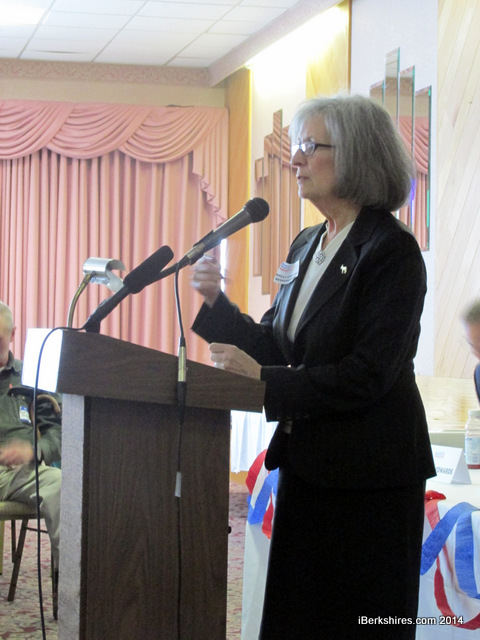 Berkshire Brigades President Sheila Murray introduces the candidates. Berkshire Brigades President Sheila Murray introduces the candidates. |
Coakley expanded on access to health care, citing its particular importantance to Berkshire County, saying she wants to use case managers for people and families facing chronic health issues. That should brought into the schools as well, she said.
Berwick began his career in rural areas as a doctor and says he knows the issue well. The solution is to strengthen the overall system and "re-engineer" to one that is focused on patient outcomes instead of pay-for-service. The rural areas are in a better position to make that switch, he said.
Avellone agreed with medical loan forgiveness programs but also added that there needs to be more opportunities for residencies. He also said loan forgiveness would be extended to other practitioners and not just doctors.
As for the relationship with the governor, the lieutenant governor candidates all said they would form a team with the elected leader.
"What we've seen with the Patrick-Murray administration when the lieutenant governor was still serving was a partnership," Lake said, referring to former Lt. Gov. Timothy Murray who resigned nearly a year ago. "You need that level of partnership and commitment."
James Arena-DeRosa said the lieutenant governor role would be to bring together public and private sectors for long-term planning.
"Too often politics is about the next election," he said.
Jonathan Edwards said the role would be to help roll out and implement policies the governor crafts. Knowing the issues in all of the towns, the lieutenant governor can help to "sell" the plan.
"I'm nothing but a wingman. I'm a leader but also a wingman," Edwards said.
Steven Kerrigan, too, said he would be a partner with the governor in helping to make sure that the government is "efficient and effective." He says the role would also be building trust between the administration and the voters.
"We can work on job No. 1, which is building back a gap in trust between the voters and the government," Kerrigan said.
Republican Candidate For Governor Baker Stumps In Pittsfield
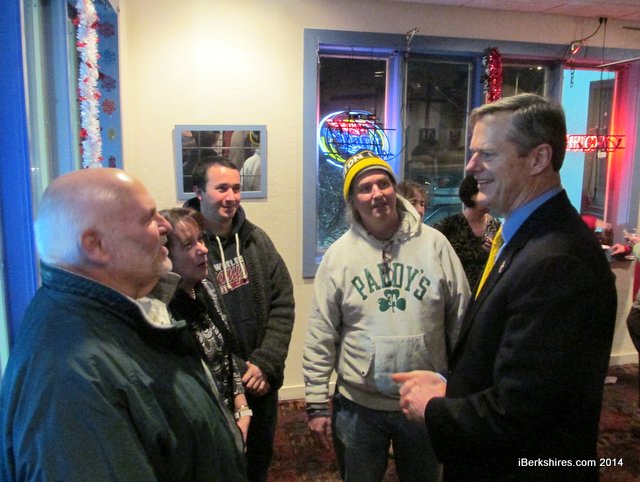 Charlie Baker, on the right, meets with the Berkshire County Republicans on Tuesday night after taping a show on PCTV. Charlie Baker, on the right, meets with the Berkshire County Republicans on Tuesday night after taping a show on PCTV. |
PITTSFIELD, Mass. — Charlie Baker says that in order to get the best results, you have to "have both teams on the field."
Baker met with the Berkshire County Republicans on Tuesday at Zucco's Family Restaurant.
He is one of two GOP candidates after Mark Fisher of Shrewsbury announced his intention to run in December.
Baker told the local committee that he wants to use his 25 years of experience in the public and private sectors to improve the state's economy and school systems.
"We haven't created a single net new job in 13 years. We have the same number of people working that we had in 2000. How can that be? How can a state that brings everything we bring to the table lag when it comes to growing and creating jobs and economic opportunity?" Baker said.
"The answer is pretty simple. We are wicked smart but we finished 48th or 49th in every single survey that has to do with the cost of almost everything."
Baker boasted of his tenure as CEO of Harvard Pilgrim — taking the job when the company was going into receivership. While nobody thought the company could make a financial turnaround, Baker said he "set the bar high" to turn it around. He said the company is thriving, and he left in 2009 to bring his ideas for success to state government.
In 2010, Baker ran for the governor's office but lost to Deval Patrick, who was running for a second term. But in that race, he learned a lot about the concerns of municipalities around the state. In this campaign, Baker says he won't be spending time just learning the issues but instead focusing his conversations on how to solve them.
What he is hearing is that voters "want is a hands-on governor who can get stuff done" and he cited his time working under former Govs. William Weld and Paul Cellucci as being able to work with a Democratic House and Senate to better the state.
"We saw problems. We got stuff done. We made government work and we put people back to work," Baker said, particularly pointing to education reform as leading to rising to SAT scores, to workers' compensation reform and to the jobless rate going from being the worst in the country to one of the best.
But since the 1990s, Baker said the state "lost its fastball." Economic development as his No. 1 priority, with closing the achievement gaps in schools and working with municipalities to create economic strategies being the focus.
His belief is that the state needs a Republican in office to help bring the best ideas to the table — not just one, Democratic viewpoint. And that theory dates back to his childhood dinner table when his Republican father and Democratic mother debated issues. His parents would debate the "means" while trying to achieve the same "ends."
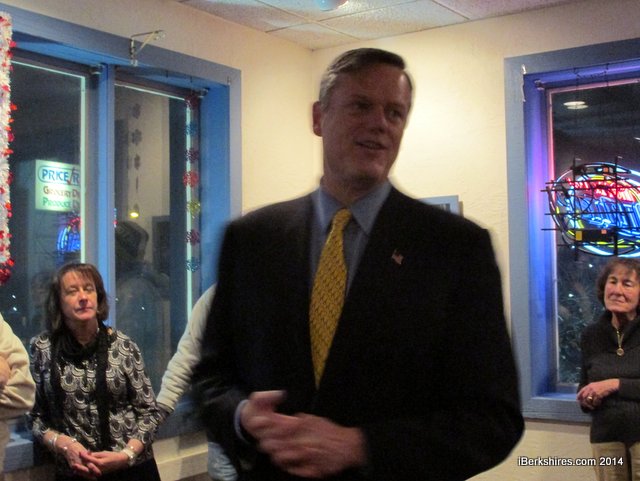 Baker gave a 15-minute speech before fielding questions from the audience. Baker gave a 15-minute speech before fielding questions from the audience. |
"What my parents showed me all that time when I was a kid was, in fact, true. You do get a better product when you have both teams on the field," Baker said. "You do get a better result when you have two teams competing. You get a better government and better process when you have more than one set of ideas engaged."
The solutions to the state's problems aren't complicated, he said, because the answers are there. It is just finding the best solutions and "replicating" them.
"I know how to set the bar high. I know how to build teams. I know how to hold people accountable and help them get over the bar," he said.
One thing he'd like to implement if elected is a massive regulatory review. He said government adds regulations to businesses but seldom cleans up prior ones, allowing them to pile up. Now there are cases where complying with one state agency can lead a business to be out of compliance with another.
"The state needs to speak with one voice on this," he said.
He is calling for legislators to do a full review of the regulations every couple of years and debate the need and effectiveness of them. He is also calling for standing committees that will work with those who will are being regulated because "some of the best ideas" will come from them.
Overall, Baker described his leadership as one that "dreams big" and "sets the bar high." He wants the state to work hard and for the taxpayers to get value out of the money they put into the system.
"I don't want Massachusetts to be great just here, here and here. I want Massachusetts to be great everywhere," Baker said.
After a 15-minute speech Baker fielded questions regarding issues of senior care, homelessness, business, veterans and transportation. Baker was also a guest on Berkshire GOP's television program "Out Front TV" on PCTV.
Baker is the most recent of the gubernatorial field to visit the Berkshires; Fisher is expected to visit the region in the coming weeks. On the Democratic side, Martha Coakley, Joseph Avellone, Donald Berwick, Steven Grossman and Juliette Kayyem have all held at least one campaign event (Coakley, Grossman and Berwick have held two) in the Berkshires. Independent Evan Falchuk was in the Berkshires twice.
While this was Baker's first trip since entering the race in September, he told the crowd that it won't be his last.
Correction: An earlier version failed to note that Republican Mark Fisher had entered the race for governor. iBerkshires regrets the error.
GOP Gubernatorial Candidate Baker Visits Pittsfield
 |
| Charles D. Baker Jr. |
PITTSFIELD, Mass. — Republican candidate for governor Charles D. Baker Jr. will visit Pittsfield on Tuesday, Jan. 21, to appear on a local access show and meet with voters.
Baker will be the guest on Berkshire GOP's television program "Out Front TV." The monthly cable program is broadcast throughout the Berkshires and in the Western Massachusetts cities of Greenfield, Northampton and Westfield. Jim Bronson, chairman of the Berkshire County Republican Association, hosts the television program.
"We are thrilled Charlie is coming back to the Berkshires," said Bronson. "We look forward to his appearance on our show; he's a terrific candidate and will surely be a terrific television guest."
Baker has served as the state's secretary of finance and administration and health and human services. He has spent the past decade as chief executive officer of Harvard Pilgrim Health Care. He ran unsuccessfully for governor in 2010.
"Out Front TV" issues commentary and features political guests such as former Sen. Scott Brown, former Gov. Jane Swift, Mary Z. Connaughton, Baker's running mate for lieutenant governor Karyn Polito, Don Humason, Michele McPhee, Jim Wallace and William Sturgeon.
Baker will address supporters at Zucco's Family Restaurant, 451 Dalton Ave., at 6 p.m. The public is invited.
Gubernatorial Candidate Kayyem Focuses on Future
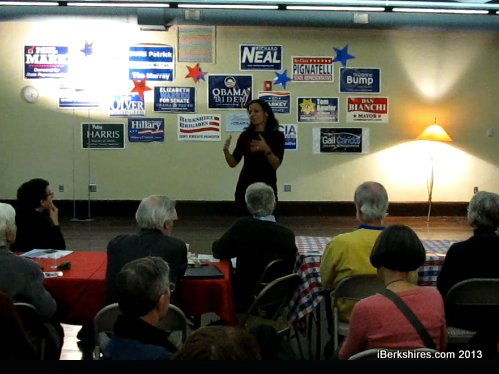 Juliette Kayyem talked with the Berkshire Brigades on Wednesday. Juliette Kayyem talked with the Berkshire Brigades on Wednesday. |
PITTSFIELD, Mass. — Juliette Kayyem doesn't do luck. She does preparedness.
After being called on three times to lend her hand to the government in the wake of tragedy, she is trying to get out in front by running for governor to make sure Massachusetts is prepared for the future.
"We need to solve the problems of today and there are many. But, we need to solve the problems in a way that is sustainable in the future," the Democratic candidate said at a meet and greet on Wednesday with the Berkshire Brigades.
Kayyem's career began as a civil rights attorney before she moved into homeland security. She served on the National Commission on Terrorism and later was appointed by Gov. Deval Patrick as the state's first undersecretary for Homeland Security, leading the state's push for security planning.
She moved back to the federal level as President Barack Obama's appointment for assistant secretary for intergovernmental affairs. There, she coordinated responses to major tragedies such as the BP oil spill and the H1N1 flu outbreak while also planning on issues such as immigration.
"Two presidents and a governor have asked me to make government work when it matters the most but it matters most all of the time and that's the way I would think of it as governor," said Kayyem, who also adds lecturer at Harvard, former Boston Globe columnist and mother of three to her resume.
Kayyem said her task in those roles was not just focused on terrorism but all of the factors that contribute to safety and security — such as gun control or climate change.
"I know people hear homeland security and they think terrorism. But, it is not that. Homeland security is as much about the homeland as it is security," she said.
Her views on climate change is one example of how she would prepare the state for the future. While Kayyem believes the state should reduce carbon emissions, she also believes it should build infrastructure to reduce the effects. She said it was only a few miles and low tides that kept the state from being significantly impacted by last year's Hurricane Sandy. Since the state can't solve the problem alone, Massachusetts needs to be prepared for the changes.
Another way the state needs to prepare is economically, because she doesn't believe the state's revenue projects are correct — particularly with the amount expected from the tech tax that was repealed and income from casinos. Nor does she believes the current tax system will provide the needed revenue for the future.
"We're not sure what we can expect from that," Kayyem said. "It is the obligation of the next governor, you need to figure out what does the budget look like and what is realistic and unrealistic sources of revenue."
She is calling for a complete overhaul of the tax system, reforming the criminal justice system, and finding where to reduce expenses.
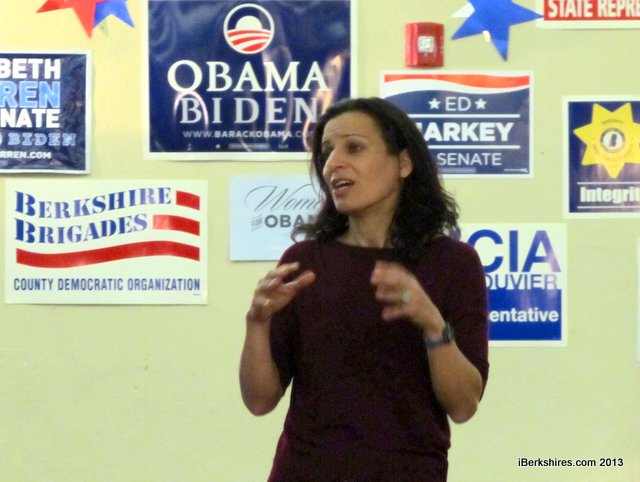 Kayyem's career has been focused on public safety but she wants to do more for the people of Massachusetts. Kayyem's career has been focused on public safety but she wants to do more for the people of Massachusetts. |
"I think we're going to have to start talking about a new tax system that is fair for everyone and gives the state a source of revenue not just for today but in the future," she said.
And as with other democrats, she is calling for investment in infrastructure and education — saying those are ways the state can best prepare for the future.
She said the state shouldn't be backing down from economic competition with other states or countries but push to make the state the best.
"All of us on the Democratic side are going to talk to you about jobs, education and infrastructure. And that's good. I'm going to talk about raising the minimum wage and that's right. And paid sick leave and that's right. That's the bare minimum. What we need to prepare for is a stronger, resilient state in the future," Kayyem said.
Kayyem said the state needs to have a vision of what it wants to be in the future and set a path to together. There are jobs in transportation, life sciences, technology and biotechnology, she said, and government needs to cut through the minutiae to get to the solutions. Government can't just look for a quick solution, she said.
"One of the good things about being a new politician is you can see the challenges of politics," she said.
For example, Kayyem said while officials debate charter schools, they should instead be discussion how the children are currently learning and how the state can prepare them for those future jobs.
Kayyem says the government's job is to be progressive and work for everybody in the state.
"Government has the capacity to do good for people every and also that government can always do better. There is no finish line," she said. "Government's job is to open doors and make sure everyone belongs."
Kayyem joined the race for governor in August and is vying for the Democratic nomination along with Martha Coakley, Joseph Avellone, Donald Berwick and Steven Grossman. Also seeking the corner office is independent candidate Evan Falchuk and Republican Charles Baker.
Kayyem says she brings a "new kind of leadership," which sets her apart from the other candidates.
"I represent a new kind of leadership, a new generation that we saw represented in Boston race, where people like me, who have different skills — I know government but maybe politics is new to me — can actually provide a vision and a way of moving forward that is different and something people want to hear," she said.
More information at www.juliettekayyem.com.


